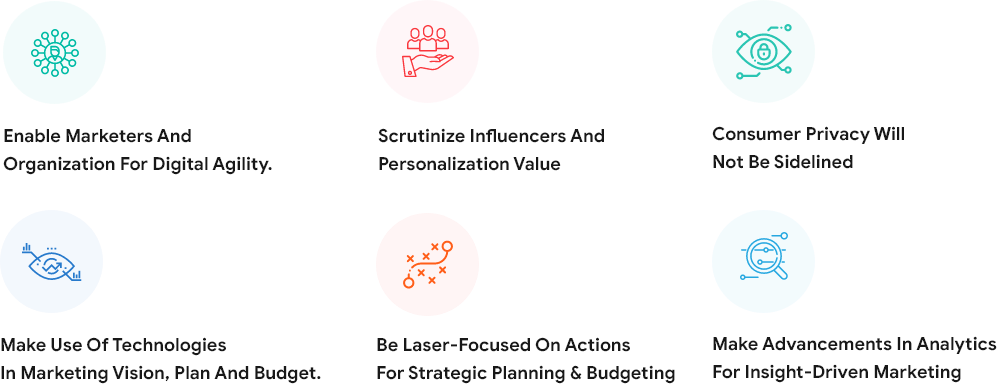
Quick Summary: Changing approaches to conversational marketing, martech, consumer data privacy, exciting possibilities for real personalization, and putting digital transformation programs in place to improve digital marketing capabilities, are among the top 2020 priorities for marketing leaders.

Marketers must comprehend the internal and external environment to execute 2020 priorities with conviction. Changing consumer dynamics, shifting socio-economic conditions, rapidly evolving new technologies, disruptive marketspaces, increasing pressures from leadership to improve revenue and adapt the business to succeed in today’s environment are forcing marketers to recalibrate their goals, resources and investments for success in 2020. At the same time organizations are striving to become digitally agile to enable digital marketing agility, the intended outcomes of which are not feasible without a strong organization behind it.
Our observations from 2019 identify these initiatives as being the most critical to marketing success in 2020. Developing roadmaps and frameworks for communicating these marketing priorities to the C-suite and broader marketing force will be utmost importance to the CMO.
Let’s have a look at these priorities:
Ask CMOs at a conference about the challenges that keep them up at night. And the common answer is around disruptive technologies, data deluge, empowered customers, maddening competition, and proliferated social channels. But ask them one-on-one privately, and don’t be surprised to notice the conversation going a different direction – to the organizational issues that enable or hinder the growth and innovation. It’s clear: Marketers cannot deliver on their commitments for customer-driven revenue growth using old organizational structures over-layered with new technologies.
These are lesser the times of exclusive focus on “run” activities like campaign and lead management and more the times of portfolios that consist of strategic activities like martech strategy, process development, deep analytics, performance measurement, talent development, finance, and budgeting. Marketing operations, search for marketing models, and investments in core capabilities are on the rise and will continue to challenge marketers from an execution standpoint.
To ensure marketing excellence in 2020, companies will look closer into the gaps and benchmark the current structure, capabilities and maturity level to allocate resources to the biggest impact areas. And digital Transformation programs shall be looked to counter problems such as lack of focus on integrated strategy, testing, and optimization and structural issues like teams working in silos or lack of skills among human resources.
How brands are engaging with people and their devices is making marketers rethink their martech selection and investments. Martech is now core capability for marketing teams. But martech strategy, evaluation, adoption and uses continue to baffle one in five marketers. Companies balance their use of internal talent and external services to remain competitive and align martech investments to business goals. Knowing what to invest in and when – to future-proof business; which technologies are emerging, plateauing, over-hyped, or ready for the show helps decide which technologies to use and to avoid for areas such as VR, AR, Mobile Ads, Gamification, Programmatic Ads, Wearables, and much more. 2020 will see brands optimizing marketing agency spend, hiring martech generalists to help team meet fast-changing customer demands and strategically important data integrations, and navigating the complex digital landscape with firm grasp on operational areas, applications, technologies and vendors — and how they work well together.
Gartner predicts that by 2023, CMO budget allocation on influencer marketing will decrease by a third as consumers continue to lose trust in brands and entities they don’t personally know. Influencers run a risk of losing consumer trust on account of poor-quality product promotions or misrepresentation of themselves. Instead of abstract brands and entities they don’t personally know, consumers are slowly turning to family, friends and local businesses to provide product advice and commercial service. Brands also run a reputational risk in case when influencers express views in ways counter to the brand. Hence, marketers may not give a lot of weightage to big-ticket influencers in their marketing strategies for 2020 and instead focus on small influencers with focused persona and fewer followers.
Personalization means personalized content, products, emails and more. But it has come under scrutiny for performance measurement. Data from Gartner personalization studies say that 14% of total marketing budget is now allocated for personalization pursuits, 44% of which is absorbed by technologies used for it. High budgets and high expectations but ROI from personalization is hard to quantify for marketers. We believe that 2020 will see marketers retrench to basics and fixing clear personalization strategy, identifying high-potential use cases and analyzing customer journey maps to identify value moments where a more personalized experience could deliver value.
To stop getting hijacked by short-term targets, “check the box” tasks, tactical plans, preoccupation with operational issues, fear of failure, marketers need strategic mindsets, and the will to reset their priorities, align with enterprise goals of growth and innovation and minimize costs of change effectively for successful execution of initiatives despite changing and often unpredictable business conditions. Most companies are now pursuing strategies that involves coordinated changes across the business. Marketers look for business value in the cost architecture of their functions and cost optimization stays as continued discipline for resources in growth initiatives. Determining an action plan that states how the objectives will be met, including specific measures to track progress, and robust to quantify that progress effectively, determining capability gaps, what needs to be emphasized or deemphasized – will be the demands on marketers to support business goals.
Data concerns are not the concerns for CIOs & CFOs but marketers will need to work with colleagues to mitigate the security violations and assure customers that their data is safe. Repeated privacy faux-pas have made consumers insecure about their data safety with online brands. And traditional identification tracking methods such as cookies makes media ROI identification difficult. Emerging technologies have the potential to help. The solutions may come from Sourcepoint and Identity Access Management solutions shall be adopted widely and new solutions will have to be identified in response to Google and Apples Ad-targeting limitations.
Everybody is a huge fan of analytics and insight to drive business performance and digital marketing. Businesses aim to improve their data-driven marketing and users of customer analytics are 23 times more likely to outperform their competitors in customer acquisition and 9 times more likely to surpass them in customer loyalty. Advances in customer analytics and insights will be something that marketers can simply not afford to loosen grip on.
In August 2019, Gartner published their latest digital marketing and advertising Hype Cycle with recommendations on 22 technologies marketers should focus on in the year ahead. Of those, the three most significant to consider are personification, real-time and conversational marketing. Personification is closely related to personalization and can be delivered by providing segment-based communications. Real-time marketing covers a range of established techniques such as marketing automation and personalization in response to customer behaviour, e.g. consumption of media, content or responding to messaging. And conversational marketing brings together rapid consumer adoption of smart speakers and innovation in search query processing, conversational interfaces and messaging. Unlike traditional strategies, this form of marketing is now available across multiple channels, allowing brands to meet customers on their terms: on the devices, platforms and time schedules that suit the customer best. Conversational marketing facilitates a one-to-one, real-time connection between marketers and customers.

Other hot trends and on-the-rise technologies to consider for 2020 include:
Join our growing community and get inspiring articles.
Our highly trained talented teams are committed to providing you with top-level, technical or any other support 24*7.
Ready to get started? Give us a call.